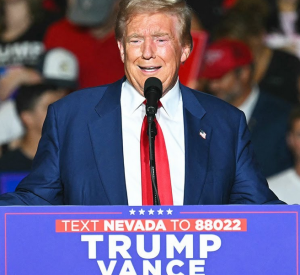As the 2024 election approaches, Donald Trump's campaign has shifted its focus to minority communities, emphasizing economic empowerment and small business initiatives. By advocating for policies that support entrepreneurship, Trump seeks to appeal to diverse voter groups, alongside recent endorsements that strengthen his outreach efforts.
Trump Targets Minority Voters with Economic Empowerment Strategy Ahead of 2024 Election

Trump Targets Minority Voters with Economic Empowerment Strategy Ahead of 2024 Election
In a strategic shift, Donald Trump's campaign focuses on minority communities, emphasizing economic growth and small business support to reshape voting patterns.
In the lead-up to the 2024 election, former President Donald Trump’s campaign has made a strategic pivot by focusing on an often-overlooked demographic: minority communities. With an emphasis on economic empowerment and initiatives aimed at supporting small businesses, Trump seeks to enhance his appeal and challenge the traditional voting patterns that have previously shaped the political landscape.
During his rallies and public appearances, Trump has highlighted the importance of tailored economic policies designed to bolster small businesses, a message that strikes a chord with minority entrepreneurs. Advocating for initiatives such as lower taxes, reduced regulations, and increased funding for business programs, he positions himself as a leading advocate for financial growth and self-sufficiency. This strategy mirrors some of his administration’s past policies, including Opportunity Zones that directed investment flows into economically distressed regions.
Recent endorsements from notable figures within Black and Hispanic communities have further strengthened Trump’s efforts in this outreach. By partnering with influential advocates who share his commitment to economic revitalization and community stability, Trump aims to connect with diverse voter groups that are seeking substantial change. These endorsements help build a bridge between the traditional Republican base and these historically overlooked communities.
At various campaign events, Trump has contrasted his economic strategies with Democratic policies, stressing their alignment with the everyday concerns of minority communities. “We are dedicated to fostering stronger, safer neighborhoods where small businesses can thrive,” he stated in a recent address.
By focusing on swing states with significant minority populations, such as Arizona and Nevada, Trump’s campaign demonstrates that this engagement is not merely rhetorical. With specific policy details targeting minority business owners and workers, Trump aims to potentially alter the electoral map in ways that may surprise political analysts.
As Election Day draws nearer, this strategic focus on economic growth and partnerships with minority communities could be pivotal in influencing independent and undecided voters who are looking for avenues to achieve prosperity. For many, Trump’s prioritization of entrepreneurship and economic revitalization could significantly impact their voting decisions.
During his rallies and public appearances, Trump has highlighted the importance of tailored economic policies designed to bolster small businesses, a message that strikes a chord with minority entrepreneurs. Advocating for initiatives such as lower taxes, reduced regulations, and increased funding for business programs, he positions himself as a leading advocate for financial growth and self-sufficiency. This strategy mirrors some of his administration’s past policies, including Opportunity Zones that directed investment flows into economically distressed regions.
Recent endorsements from notable figures within Black and Hispanic communities have further strengthened Trump’s efforts in this outreach. By partnering with influential advocates who share his commitment to economic revitalization and community stability, Trump aims to connect with diverse voter groups that are seeking substantial change. These endorsements help build a bridge between the traditional Republican base and these historically overlooked communities.
At various campaign events, Trump has contrasted his economic strategies with Democratic policies, stressing their alignment with the everyday concerns of minority communities. “We are dedicated to fostering stronger, safer neighborhoods where small businesses can thrive,” he stated in a recent address.
By focusing on swing states with significant minority populations, such as Arizona and Nevada, Trump’s campaign demonstrates that this engagement is not merely rhetorical. With specific policy details targeting minority business owners and workers, Trump aims to potentially alter the electoral map in ways that may surprise political analysts.
As Election Day draws nearer, this strategic focus on economic growth and partnerships with minority communities could be pivotal in influencing independent and undecided voters who are looking for avenues to achieve prosperity. For many, Trump’s prioritization of entrepreneurship and economic revitalization could significantly impact their voting decisions.



















